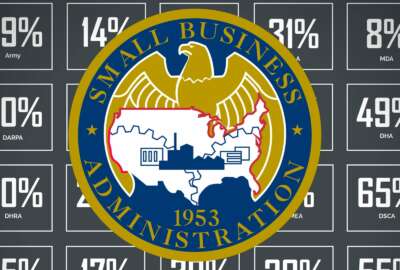
Price competition driving some vendors to think differently
The president of PM Consulting Group said to be successful in the federal market, small firms have to think less about agency goals and more about how to solve...
Views from the Corner Office is a new show designed to talk to the private sector leaders that influence and impact the federal market. The goal of this monthly discussion is for federal executives, lawmakers and other industry experts to gain insights and a better understanding into the trends, the challenges and the evaluation of the technology, acquisition and leadership in the federal market by the executives who lead the federal practices of government contractors.
Walter Barnes, president of PM Consulting Group, sat down with executive editor Jason Miller at Federal News Network’s studios in Chevy Chase, Maryland. Here are some excerpts from that discussion.

State of the Federal Market
JM: Is it a good time to be a federal contractor?
WB: Yeah, I think it’s a great time. I think that there’s a lot of opportunity in the federal space. There’s a lot of information out there that the government has been, good at pushing out to the vendors. It really makes for a lot more planning, a lot more strategic development as far as what are you doing in the market? What is your skill set? What are your capabilities? Do you have the proper infrastructure? But the opportunity space is definitely there, and it’s very competitive as well.
JM: Is it tough to be a small business in the federal market?
WB: Looking at the [governmentwide small business] goals in which agencies hit their goals is one way to kind of find certain opportunities or certain areas of interests, but personally we haven’t approached it that way. As we start to look at the years that we have in the 8(a) program, we have nine years and we’re in year three right now, the thought that always comes to my mind is what are we going to do when we graduate? Right? Or what if we size out of being a small business? So, while we look at the goals per agency, we don’t make that a priority. We focus on establishing that relationship with the client and seeing where we can help them solve business problems.
JM: What’s the reaction you get from the federal clients about being a small business? Do they want to talk to you? Is it hard to get a meeting? A lot of times for small businesses, there’s a lot of frustration when they say, ‘well, no one will meet with me or nobody will give me the time because all they want to do is talk to the bigger companies.’ What experience are you guys having?
WB: Over time, we’ve seen that evolve, right? So in the government space, there’s been a push to give small businesses more access. I think it’s incumbent upon the small business to research, understand and do all the capture work before you go into that meeting. The more of us that go into that meeting, understanding their [the agency’s] business problems and how we can apply our solutions to add value, the more they’ll be willing to meet with other small businesses. I think the accessibility has been better. But it can always get better. We’ve noticed a lot of momentum. We did a lot of sub work, initially. We got our first two prime contracts in 2017 and then that kind of opened up the door. What I have always felt is that the government client wants to know if you can manage this contract. Are you a low risk service provider? Do you have the infrastructure? And I think once you start accumulating more prime contracts, it’s real proof that you actually have that capability.
Category management is a good thing
JM: What are some trends you are seeing in the federal market?
WB: One of the trends is competitive pricing. As we start to move away from primarily looking at subcontracting work and moving into let’s say 8(a) directed award work and then moving into 8(a) competitive or full and open work, pricing has been critical, especially in the professional services space. A lot of times you get into these price shootouts. I think having a good handle on your cost structure, your pricing models and what’s in and out, and having that good financial management support on your team is extremely important. Competitive pricing is a trend that, I think anyone in the federal space will agree with me, is becoming extremely difficult to really get to that right price.
Related Stories

Number of small business prime contractors down by 25 percent since 2010
 Exclusive
Exclusive 7 ways to make category management more responsive to small businesses
Removing the roadblocks
JM: What can the government do to improve your, and really all small businesses’ ability to compete and provide services?
WB: One of the common themes that we talk about is the request for information (RFI) process. To be honest, a lot of small businesses rely heavily on responding to those RFIs to get the attention of the programs to say “Hey, we can do this work.”
Larger firms have well-established hands into a lot of the agencies, so they already have those established lines of communication. If you’re a small business, you’re coming in cold many times. How do I get that started? An RFI is a good way to communicate that. The problem is that we’re not getting a lot of feedback. We spend time on the response and we think we have a good solution to the problem and it feels like at least it goes into a black hole.
I think that is an area that needs improvement. That’s a challenge that small businesses go through as far as access. I believe that if they provided a little bit more feedback to industry based on the responses that would be helpful.
He was the DJ, I was the emcee
JM: Tell me something about yourself outside of your day-to-day role at PM Consulting.
WB: I was a college DJ or I would say emcee. My best friend in college was a real DJ with the crates of records and stuff. And this was 1997 or 1998 at Virginia Tech. We had the hip-hop and R&B kind of segment on Virginia Tech Radio. A lot of people don’t know about that. It was a great experience.
And so everyone’s listening to the radio and we had a nice segment there for two years. We had a lot of callers — and they were among the most popular callers — from the guys at the Montgomery County, a prison facility in Montgomery County, Virginia. They would call in and ask for all kinds of stuff. We were like, “I can’t play that explicit stuff but we can play this,” you know, so Biggie and Tupac and that was kind of music in that era. They would always say, “hey man, thanks.” We would shout them out on the air all the time. I never actually ran into anyone from the prison system, but it was really cool to kind of give them that kind of a voice, if you will.
Copyright © 2025 Federal News Network. All rights reserved. This website is not intended for users located within the European Economic Area.
Jason Miller is executive editor of Federal News Network and directs news coverage on the people, policy and programs of the federal government.
Follow @jmillerWFED




